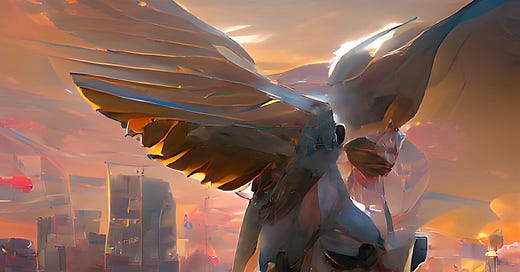Humans are hardwired to be storytellers, story consumers, testers and builders, listeners, learners, communicators, and designers. Since the dawn of humankind, we’ve relied on stories to unite and separate communities and to spread lies and truths. The metaverse will expand our capacity to create and experience stories and worlds.
As author Lisa Chron wrote in her book, Story Genius, “Story was the world’s first virtual reality.”
We use the categorization and naming of “ages” to chart our creation efforts and the evolution of humankind’s technological developments.
For example, we’ve had the following creation periods:
· Bronze Age
· Iron Age
· Late Middle Ages
· Renaissance
· Early Modern history
· Modern History
· Industrial Age (1760-1970)
· Machine Age (1880–1945)
· Age of Oil (1901–present)
· Jet Age (1940s)
· Atomic Age (a.k.a. Nuclear Age) (1945/1950–present) [2]
· Space Age (1957–present)
· Information Age (1970–present)
· The Multimedia Age (1987–present)
· The Social Age (1996–present)
· The Big Data Age (2001–present)[3]
Alongside these ages and technological developments, we’ve experienced parallel storytelling innovations. If we look at the ages by storytelling method, maybe we’d say:
Stone carvings/hieroglyphics
The invention of paper
Printing press
Refillable ink pens
Typewriters
Computers
The Internet
Social Media
The democratization of video and image production
(I’m not adding the Deep fakes/Botapocalypse/AI storytelling here because it hasn’t been democratized and isn’t accessible to the masses)
Now, I believe we will eventually enter a new phase; I call it, The Age of Imagination. Other folks have called it the same, though I didn’t know this until I decided to search for the term.
Wikipedia defines the Age of Imagination as: “a theoretical period beyond the Information Age where creativity and imagination will become the primary creators of economic value. In contrast, the main activities of the Information Age are analysis and thinking.”
During the Age of Imagination, the creation of worlds, of digital worldbuilding, like video game worlds, will become democratized. The metaverse will enable this new era.
What do I mean by the democratization of worldbuilding? Well, in the past, it took a team of people reproducing words to spread textual messages; each book and article needed to be hand-copied. Next, the printing press made it easier to spread text. Then we had publishing companies and centralized text-spreaders, and now we have self-publishing, the Internet, blogs, social media, and anyone can publish and spread ideas (even robots). Mass written communication is democratized. Even the creation of websites has basically been democratized.
Likewise, in the past, it required a huge budget, heavy equipment, and teams of people make a movie. Now anyone can make films cheaply and easily with their cellphone and distribute them online at a very low cost. So, by democratization I mean the cheap and easy production; I believe this is coming next for worlds, aka immersive video games/experiences/digital, virtual communities.
People like Mark Zuckerberg are extremely focused on building a composable metaverse, also known as Web3. “Composability” — the ability to create, change, and easily build out worlds is paramount to Meta’s vision and Zuckerberg has repeated this many times.
Others, like the founders of Sandbox and Decentraland are equally intent on ensuring composability and on making sure these worlds are not only “buildable” by users, but are also decentralized, owned, and governed by the users, unlike Meta which will be governed by a corporation/the government’s laws that govern the corporation’s activities…
The vision of these composable worlds, of the metaverse itself, which Zuckerberg refers to not as a “place” but as a “time period,” is exciting for many reasons, but I’d like to focus on its application to writing and storytelling.
Within the metaverse, creators and authors will soon be able to build entire worlds. They’ll be able to allow readers to immerse themselves in the virtual worlds of their books. Characters can be avatars readers will wear or interact with (more on this later as it raises some unique ethical concerns). Authors can build the locations for their stories. Readers will also be able to build fan kingdoms. You could even build your own thematic- amusement park bookstore that only sold your books and the books of your other favorite authors. Books and video games could merge in a new way, like virtual versions of the Choose Your Own Adventure novels of my childhood.
Already, anyone can use text-based instructions to create visual art with the assistance of AI. This simplicity of creation via text will eventually work for video and then for virtual world construction.
For my own Psychedelic Love Series books, I’d love to create virtual worlds of the psychedelic trips in the novels, where readers could step in and experience the visuals and sensations I’ve written about — like they were really inside the character’s minds.
For example, here is an image I made with AI to represent one of the psychedelic trips in my book, Mushroom Honeymoon.
In this scene, Thelma, the main female character sees a prophetic vision of a spider eating an organ during a psilocybin mushroom trip. This is a darker scene in the book, but one could create a fantastic, joyous scene to embody and experience just as easily.
The possibilities for these creator-driven worlds are as endless as the human imagination. This is why I call the inception of the new, buildable metaverse the dawn of the Age of Imagination.
As I mentioned, this is not a new term. The Age of Imagination was first coined in 1993 by designer and writer Charlie Magee. He writes, “People today make an income by manipulating information, therefore, The Information Age. People made an income with industrial and agricultural tools, therefore The Industrial and Agricultural Ages. The assumption is that human society can be adequately described in the terms of the tool we use to purchase survival. This type of planning for the future is like trying to walk across town with binoculars glued to your eyeballs. We need a bigger metaphor, one that encompasses much more than economics, one that occurs before anything can be purchased or acquired. I suggest that communication is a better metaphor for understanding human evolution. Evolution equals survival of the fittest communicators.”
You can read his entire essay on this topic here.
The idea was later elaborated on by writer, Rita King in 2007, who said, “The Imagination Age is a way to think about transitioning from the Industrial Era, as much as transitioning into the Intelligence Era. If we apply imagination to the way we work, we can intentionally design better ways of working instead of continually reacting.”(from Forbes’ Thinkers and Innovators series)
And many modern thinkers, especially GenZ and Gen Alpha westerners, are perfectly poised to enter this new age because they’ve already grown up with composable, digital worlds through extremely popular games like Minecraft and Roblox, both of which are buildable digital worlds easy enough for young children to use.
VRChat is a popular composable world currently in the Metaverse, with Decentraland and Sandbox also on the rise. However, VRchat is challenging to build worlds in and has a high learning curve. It also requires expensive equipment, same with Meta’s Horizon’s world- their own VRChat competitor. As many have stated, we are in the Pong era of the metaverse, and it’s not yet accessible to everyone. In the future, this will change, and building worlds will become as easy and cheap as making blog posts.
Imagine if Michael Angelo could build the Sistine Chapel almost for free, as easily as one creates a Facebook group? The Age of Imagination will allow a future Michael Angelo to do this. Anyone will be able to construct entire planets, villages, landscapes, museums, historical worlds, future worlds, and cities for others across the globe to experience. Digital building will be vastly cheaper than real-world construction. We will learn and dream in these new composable, citizen-created virtual spaces.
Our children’s children will look back on our current internet (Web2) like a black and white silent film once the metaverse (Web3) really goes live.
Will there be challenges and ethical conundrums in this new Imagination Age? Of course, but we can and will overcome and manage problems as they arise. We must not fear this metaverse future; we must nurture it and cherish it because it will allow human imagination to democratize and flourish like never before. We must also strive for true decentralization in the metaverse to ensure freedom for all.
I think it’s going to be a fantastic age, and I hope I live to see it fully embraced.
Also, shoutout to Joanna Penn, author and the host of the podcast, The Creative Penn, who wrote an entire book on the potential the metaverse offers for authors and writers, called, Artificial Intelligence, Blockchain, and Virtual Worlds: The Impact of Converging Technologies On Authors and the Publishing Industry and who has spoken many times on the potential she believes the metaverse holds for writers.
As usual, I’ve used AI to make the all the images for this piece.
















Share this post